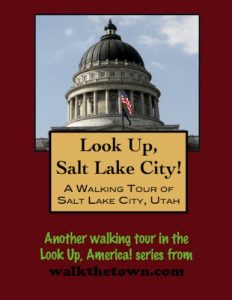There is no better way to see America than on foot. And there is no better way to appreciate what you are looking at than with a walking tour. Whether you are preparing for a road trip or just out to look at your own town in a new way, a downloadable walking tour is ready to explore when you are.
Each walking tour describes historical and architectural landmarks and provides pictures to help out when those pesky street addresses are missing. Every tour also includes a quick primer on identifying architectural styles seen on American streets.
Founded by Joseph Smith in 1830, The Church of Jesus Christ of Latter-day Saints is the largest church to originate on American soil, boasting a worldwide membership of over 14 million. in its tumultuous early years Smith intended to establish a New Jerusalem called Zion but pursuit of that goal was undermined in Ohio and Missouri and Illinois. As conflict escalated in illinois, Smith had predicted the church would need to go West and be established in the tops of the Rocky Mountains. In 1844 Smith and his brother Hyrum were hauled from a jail by a mob in Carthage, Illinois, where they had surrendered on charges of treason in relation to the destruction of an unfriendly press, and murdered by multiple musket blasts.
Brigham Young ascended to the leadership of the church at the age of 46 and led the Mormon pioneers west as Smith had advised, first to Nebraska and then on to Utah where 143 men, three women and two children stopped and settled several miles east of the Great Salt Lake on July 24, 1847. Young set up a system of communal crop sharing and guided the settlement spiritually and politically as thousands of Mormon pioneers came to Salt Lake. But it was not to be an insular Mormon town for long.
The California Gold Rush brought many fortune-seekers through Salt Lake City which was becoming a trading post and crossroads. The railroads were crossing the territory as well and soon there would be rich mineral strikes in the nearby mountains. Most intrusive of all was the federal government that battled the Mormons, sometimes with soldiers but mostly through the courts, over the Mormon practice of polygamy. Tensions between the church and non-Mormons would not ease until the early 1900s.
By that time Salt Lake City was the dominant city of the Intermountain West, enriched by the mines and the railroads and the banks the wealth financed. Unlike many cities that annexed surrounding towns as they expanded through the 20th century, Salt Lake City watched its suburbs incorporate as separate towns and actually lost population. Downtown withered as the metropolitan area exploded. It was not until the 1990s that the exodus was arrested.
Our walking tour will explore that historic core that grew on orderly axes from Temple Square, the ten acres where Brigham Young proclaimed to "build a temple to our God" and that is where we will begin, amidst gardens and fountains...
Each walking tour describes historical and architectural landmarks and provides pictures to help out when those pesky street addresses are missing. Every tour also includes a quick primer on identifying architectural styles seen on American streets.
Founded by Joseph Smith in 1830, The Church of Jesus Christ of Latter-day Saints is the largest church to originate on American soil, boasting a worldwide membership of over 14 million. in its tumultuous early years Smith intended to establish a New Jerusalem called Zion but pursuit of that goal was undermined in Ohio and Missouri and Illinois. As conflict escalated in illinois, Smith had predicted the church would need to go West and be established in the tops of the Rocky Mountains. In 1844 Smith and his brother Hyrum were hauled from a jail by a mob in Carthage, Illinois, where they had surrendered on charges of treason in relation to the destruction of an unfriendly press, and murdered by multiple musket blasts.
Brigham Young ascended to the leadership of the church at the age of 46 and led the Mormon pioneers west as Smith had advised, first to Nebraska and then on to Utah where 143 men, three women and two children stopped and settled several miles east of the Great Salt Lake on July 24, 1847. Young set up a system of communal crop sharing and guided the settlement spiritually and politically as thousands of Mormon pioneers came to Salt Lake. But it was not to be an insular Mormon town for long.
The California Gold Rush brought many fortune-seekers through Salt Lake City which was becoming a trading post and crossroads. The railroads were crossing the territory as well and soon there would be rich mineral strikes in the nearby mountains. Most intrusive of all was the federal government that battled the Mormons, sometimes with soldiers but mostly through the courts, over the Mormon practice of polygamy. Tensions between the church and non-Mormons would not ease until the early 1900s.
By that time Salt Lake City was the dominant city of the Intermountain West, enriched by the mines and the railroads and the banks the wealth financed. Unlike many cities that annexed surrounding towns as they expanded through the 20th century, Salt Lake City watched its suburbs incorporate as separate towns and actually lost population. Downtown withered as the metropolitan area exploded. It was not until the 1990s that the exodus was arrested.
Our walking tour will explore that historic core that grew on orderly axes from Temple Square, the ten acres where Brigham Young proclaimed to "build a temple to our God" and that is where we will begin, amidst gardens and fountains...






